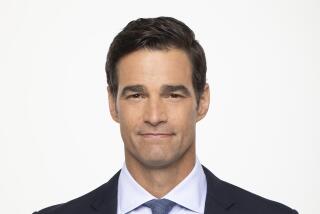Memories Put Into Play
Spalding Gray is obsessing.
At the moment, he’s preoccupied with skiing, or more precisely, the fact that he’s not skiing because of a sitcom he’s filming in Los Angeles. His call time has changed three times in the last 12 hours. The show is two days behind schedule. His chance of squeezing in a downhill fix in Utah is sliding away like a ski lost in a wipe-out.
So much for his plan to perform “It’s a Slippery Slope”--his new monologue about learning to ski--near ski resorts. Instead, Gray is chained to “Missing Links,” an ensemble sitcom about the worst golf course in America. And he is chafing at the TV bit.
After Gray agreed to play Fran Drescher’s therapist on three episodes of “The Nanny” this season, his agent began sending him TV scripts. Gray, the ultimate commitment-phobe, signed on to “Missing Links” only because his character has brain cancer and is guaranteed to die during the first season. Not one to hide his feelings--he’s known for exposing his most inner fears on stage--Gray seems to wish his character would die before the pilot.
“I am trapped, and for the first time,” he says, sitting in a crowded dressing room. “At least marriage had an out clause. I could only go into marriage with the idea of divorce. I feel very, very claustrophobic now because there’s no way out.”
But such unpredictable--and sometimes unpleasant--situations are the stuff of Gray’s monologues. Though he has acted in more than 30 films--including an upcoming film version of his “Gray’s Anatomy”--he remains best known for the autobiographical monologues he began creating in the late 70s.
“It’s a Slippery Slope,” which Gray performs this weekend at the Alex and Irvine-Barclay theaters, is the 15th installment in this ongoing miniseries.
“It’s a Slippery Slope” is about learning to ski in the same respect that his most famous work, “Swimming to Cambodia” was about acting in a movie, or “Monster in a Box” was about writing a novel. The subjects are merely frames upon which Gray hangs his memories, his tangents, his anecdotes, so that at the end of 90 minutes he’s built a verbal sculpture that is larger than the sum of its words.
Perhaps more than any of his recent works, the subtexts in “Slippery Slope” are weighty indeed: mortality, fallibility, fatherhood. Up to this point, Gray has represented himself as an everyman type, he says, a chronicler of the things that happen “on the way to . . .”
But “Slippery Slope” marks a turn for the more active. “I do think that this new monologue is a watershed in the sense of me saying, ‘I did this.’ Before I used to say, ‘Look what happened to me.’ ”
What he did, though, was not particularly admirable. He married his longtime partner and collaborator, Renee Shafransky. But that didn’t halt an affair he was carrying on with another woman--Kathie Russo. Russo got pregnant. The marriage to Shafransky dissolved. A son was born. Gray’s nervous breakdown ensued.
As the show progresses quickly through these events, Gray says, he can feel the shift in the audience. It’s uncomfortable to sit through, like being forced to overhear an argument in the restaurant booth next to your own. The laughter, from women in particular, fades. These revelations are bringing Gray, for the first time, angry fan mail announcing that he’s lost them as fans.
But it is the monologuist’s curse to relive these scenes as he tours the show for two or three years. In the hours leading up to a performance, he says, he starts to feel a deep sadness and often cries. “Then that half-hour before I go on, it’s almost like I feel the presence of Renee in the room. I can see her smiling at me.
“The downside of the monologue mode is that once you activate memory and recollection, you’re stuck in it beyond the work,” he says. “I can’t come down or shut off after I do the monologue. I’m in a very heightened mode where I have reactivated this psychic material in a way that causes me to go through the same guilt and shame, and causes me to sit in a bathtub drinking beer to try and knock myself out, to stop my memory.”
It’s a strange thing, memory. Somewhere in Gray’s head are all the monologues, all the way back to “Sex and Death to Age 14.” In there are all the memories that became the monologues, about growing up in Rhode Island with a Christian Scientist mother and a father he says had a deep belief in the virtues of cocktail hour.
There are memories of struggling in school because of dyslexia. Of his mother’s suicide at age 52. Of discovering acting--”the glorious imitation of life” he calls it--in college.
He has memories of movies: “Swimming to Cambodia” is about his bit part in Roland Joffe’s film, “The Killing Fields.” “Monster in a Box,” in turn, reflects the popularity fallout from the successful 1987 film version of “Swimming to Cambodia.”
The monologues themselves become memories. “This happens to me a lot and it’s kind of spooky,” Gray says. “I start to create a new memory. So I amalgamate people and situations and trade them. So I’ll take five different people that I skied with, put them all on one slope, make them into three, rename them, and put all the events that happened over a two-week period over two days. . . . They both have as vivid a recall in my memory bank--the monologue and the original event--because of how many times I perform the monologue. It becomes like a new memory.
“Which I think O.J. Simpson has done.”
Steven Soderbergh, who directed the film of “Gray’s Anatomy” opening in Los Angeles next week, says that watching Gray’s process of recall was remarkable. “It really was interesting to watch him perform ‘Gray’s Anatomy’ not just from memory, but out of sequence,” he says. “His ability to memorize not only the text, but the emotional tone and rhythm of each section was amazing. When I put the film together, the emotional chart of the film matched exactly the live performances I’d seen.”
Even though four years had passed since the creation of “Gray’s Anatomy,” the actor says he had no problem slipping into that former life for the duration of the 10-day shoot. “I had played it for so long, it had become a caricature of me. . . . It was like stepping into a Superman outfit: mild-mannered reporter gets into this plaid shirt. It was automatic.”
Yet all of his work does not rest on the tip of his tongue. Gray was invited, for example, to perform as many of his monologues as he wanted for La Jolla Playhouse’s 50th anniversary season this year. He told them he couldn’t.
“To redo the monologues is to have to have the desire to recollect, because I can’t memorize lines,” he says. “I can barely memorize the lines in this sitcom. I’m dyslexic. I have terrific memory problems. . . . But I can recollect. I can have a photographic recall. And that’s what I’m doing when I do the monologue--I’m describing what I’m seeing.”
The desire to recollect, it seems, is not voluntary. Gray says that while he is developing a new show and touring it, his memory is at rest. But as soon as the project starts to feel stale, the wheels start to spin. Even in the forced limbo of the TV show, he says, he’s starting to get ideas. While the other actors practice accents and play old routines, Gray is silent. He’s examining the fabric of his life, cutting it into pieces, laying them down next to one another, as he puts it: “tying these quilts of narratives.”
Yes, he says, there will be another monologue. There will probably always be another monologue, because despite all the talk in “It’s a Slippery Slope” about living in the present, Gray still thinks, breathes, operates as a storyteller.
Who knows what the material will be? Perhaps his life with Russo, their son Forrest, now age 4, and their new baby, Theo. Perhaps the new house on Long Island. Perhaps the TV show that he is about to go rehearse.
He’s collecting his fragments, Gray says, but ultimately he’s looking for a theme: making a movie, building a house, writing a book. “I don’t know what the next theme is about,” he says. “But I know it will be about whatever I’m dwelling on, obsessing on. I obsess. And I pay attention to my obsession.”
*
BE THERE
Spalding Gray performs “It’s a Slippery Slope” Fri.-Sat., 8 p.m., at Irvine Barclay Theatre, 4242 Campus Drive, at UC Irvine. $22-$28. Call (714) 854-4646, or Ticketmaster at (213) 480-3232. He performs again Sun., 8 p.m., at the Alex Theatre, 216 N. Brand Blvd., Glendale. $24-$28. Call (800) 233-3123.
“Gray’s Anatomy” opens April 18 at Laemmle’s Monica in Santa Monica.
More to Read
The biggest entertainment stories
Get our big stories about Hollywood, film, television, music, arts, culture and more right in your inbox as soon as they publish.
You may occasionally receive promotional content from the Los Angeles Times.






